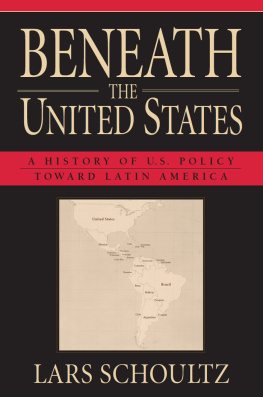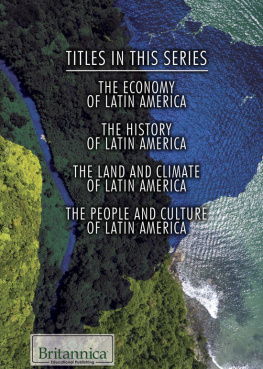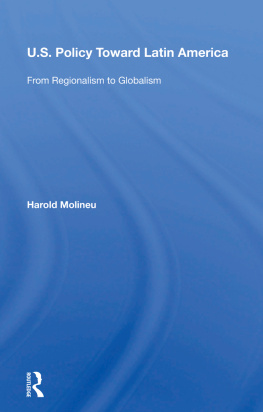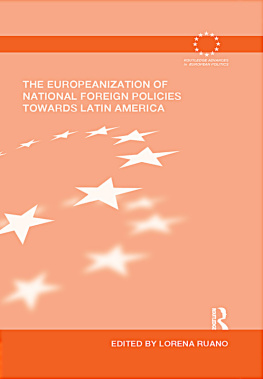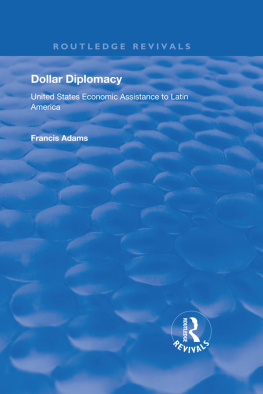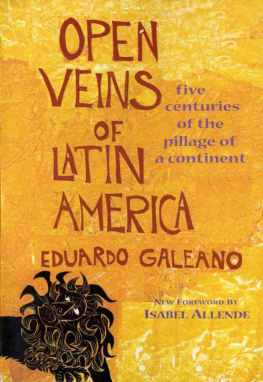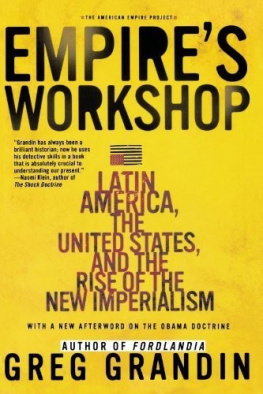Copyright 1998 by the President and Fellows of Harvard College
All rights reserved
Printed in the United States of America
Fourth printing, 2003
Library of Congress Cataloging-in-Publication Data
Schoultz, Lars.
Beneath the United States : a history of U.S. policy toward Latin America / Lars Schoultz.
p. cm.
Includes bibliographical references (p. ) and index.
ISBN 0-674-92275-1 (cloth : alk. paper).
ISBN 0-674-92276-X (pbk. : alk. paper).
1. Latin AmericaForeign relationsLatin America.
2. United StatesForeign relationsLatin America.
3. United StatesForeign relationsMoral and ethical aspects.
4. PoliticiansUnited StatesAttitudes.
5. United StatesForeign relationsPhilosophy.
I. Title.
F1418.S388 1998
327.7308dc21 97-35338
To Karina
In late 1989 President George Bush traveled to Costa Rica to participate in a Central American summit meeting, which came near the end of the most difficult decade in the history of U.S.Latin American relations. The United States was standing toe-to-toe with the Panamanian government of Manuel Noriega, openly threatening the military invasion that was to come two months later. In just two weeks, the rebel Farabundo Mart National Liberation Front would launch daring attacks on cities throughout El Salvador, prompting the retaliatory murder of six Jesuits by the Salvadoran military and revealing how little progress had been made in pacifying that country despite a full decade of U.S. effort. Worst of all, Nicaraguas Sandinistas were continuing to thumb their nose at the United States, four years after Mr. Bushs predecessor had warned that he would stop attempting to overthrow them only if theyd say Uncle. When the surrender was not forthcoming, President Reagan had gone before a prime-time television audience and declared the Sandinistas an outlaw regime.
As Air Force One was carrying President Bush from Washington, Nicaraguan President Daniel Ortega was also flying to the meeting. Arriving in San Jos dressed in military fatigues and the black-and-red Sandinista bandanna that so annoyed U.S. officials, Mr. Ortega promptly announced that his government might end its cease-fire with the U.S.-supported rebel Contras. That announcement was enough for President Bush, who took advantage of a news conference to call President Ortega that unwanted animal at a garden party. He also twice referred to the Nicaraguan chief of state as a little man, giving such obvious emphasis to the term that it prompted a reporter to ask at the very end of the press conference, Why do you keep calling him a little man? The Presidents final words were Because he isthats why.
Today these belittling statements and the policies that triggered them may seem only a reminder of a prior generations Cold War conflicts, but
This book is an explanation of the logic that underlies these statements. It is not about Nicaragua, nor is it about the other countries that lie beneath the United States, in a region called Latin America. It is about the policies the United States has used to protect its interests in Latin America. It is about the way a powerful nation treats its weaker neighbors.
A realist would explain the U.S.Latin American relationship with Thucydides aphorism that large nations do what they wish, while small nations accept what they must. This is the best way to beginbut only beginany explanation of U.S. policy, with a frank recognition of the enormous disparities between the United States and Latin America. The United States is the worlds commanding powernot omnipotent, perhaps, but significantly more powerful than any rival force that the world will see in our lifetime and, barring a cataclysm, almost infinitely more powerful than any Latin American nation can ever hope to be. This power is deeply rooted in the nations wealth. The typical U.S. citizen generates a per capita gross national product ten times that of the average Latin American, and this absolute difference in wealth underlies a nearly infinite range of derivative disparities, in everything from mortality measures to fast food franchises.
Perhaps the most obvious indicator of these asymmetries is that the United States continues to spend hundreds of millions of tax dollars each year to alter the behavior of its neighbors, while Latin Americans do not. Today, for example, the U.S. Agency for International Development is paying to install U.S.-style adversarial criminal procedures in four different Latin American countries, while no Latin American country is attempting to change the procedures used by the U.S. judicial system. Similarly, the government-funded National Endowment for Democracy is prepared to assist any Latin American country to hold a clean election, while no Latin American country has ever offered to help the United States boost its low voter turnout, nor advised the United States on the reform of its campaign financing laws. Today, U.S. law requires the President to report each year on the efforts that Latin American governments are making to stem the supply of narcotics (and to decertify those that fail to meet our standards, making them ineligible for aid), while no Latin American government reports on U.S. efforts to reduce the demand for drugs. Even the Cuban challenge is gone, symbolized by the fact that Washingtons archrival can no longer afford to blanket the shortwave bands with Radio Cuba, while the U.S. Information Agencys Radio Mart continues to provide Cubans with all the news thats fit to broadcast. And, of course, U.S. armed forces are still found throughout Latin Americaat bases in Cuba and Panama, and as mobile training teams in nearly every other country in the regionwhile no U.S. citizen believes that we have anything useful to learn from the Latin American military.
Hegemony is the term social scientists use to capture the essence of these one-way relationships. Depending on their personal preferences about specific programs, U.S. citizens praise Washingtons hegemonic behavior, criticize it, or, like Thucydides, treat it as a fact of life. We do some good things, some bad things, and some things that great powers have always done (and presumably will always do) to their weaker neighbors. The question is why. What determines United States policy toward Latin America?
Self-interest would be a realists answer. Throughout history, hegemons have sought to protect their interests by controlling the behavior of weaker neighbors. This hegemonic oversight is costly, of course, but the expense of a Marine detachment or an AID mission is usually justified with the common-sense logic that it is better to prevent something unpleasant from happening rather than to reverse it once it has happened. For more than a century the United States has rarely waited to let a problem develop. Instead, it has tried to prevent the emergence of the threat.
Driven by self-interest, this hegemonic oversight has reached unprecedented levels in the late twentieth century. Today it seems unexceptional for Washington to be nudging and nurturing Latin Americans not simply to reform their economies (something we have long encouraged), but to revamp their judicial systems and reconstitute their democracies. Woodrow Wilson, whom many consider the most patronizing of all U.S. Presidents, would not believe his eyes; he would marvel at the mere fact that the United States has created and maintained not only an Agency for International Development to assist Latin Americas economic improvement but also a National Endowment for Democracy to help with the regions political development. President Wilson may have wanted to teach Latin Americans to elect good leaders, but he would never have recommended that U.S. taxpayers pick up the tab for other peoples economic and political development.

